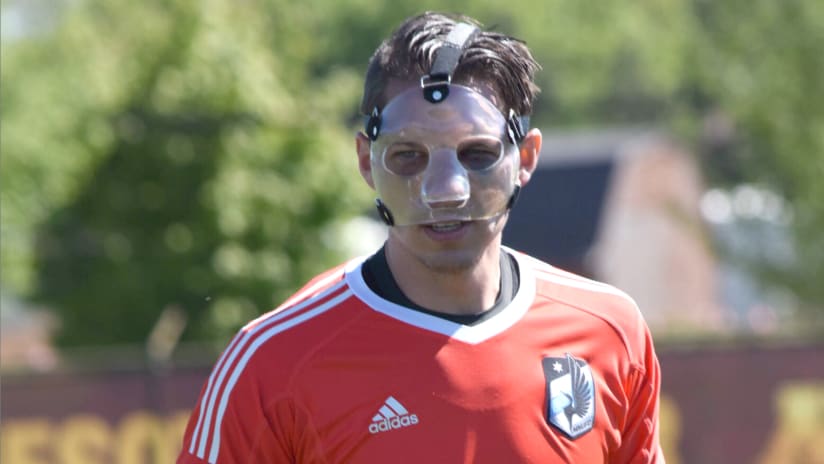It’s almost an article of faith in soccer that goalkeepers are crazy. MNUFC starting 'keeper Bobby Shuttleworth has had to deal with a concussion, stitches and a broken nose so far and the season isn’t quite a third over.
“I think anybody that's throwing themselves in front of feet and soccer balls has gotta have a couple screws loose,” he says. When he broke his nose after colliding with the foot of Sporting KC forward Dom Dwyer last week, he quashed any talk of coming out by instructing trainer Sean Kupiec to “jam some stuff up there and just get on with it.” He finished the match with a clean sheet and seven saves, breaking the club record of five saves he had set the week before.
The general consensus is that a certain level of derangement is built into the position itself. As Turkish author Emrah Serbes wrote, “While other players chase the ball, goalkeeper is the only one that stands against it.” And Russian author Vladimir Nabokov — who played goalkeeper for Trinity College in Cambridge, England — was effusive in his love for the lone-wolf element of the role in his autobiography, Speak, Memory:
In Russia and the Latin countries, that gallant art had been always surrounded with a halo of singular glamour. Aloof, solitary, impassive, the crack goalie is followed in the streets by entranced small boys. He vies with the matador and the flying ace as an object of thrilled adulation. His sweater, his peaked cap, his kneeguards, the gloves protruding from the hip pocket of his shorts, set him apart from the rest of the team. He is the lone eagle, the man of mystery, the last defender. Photographers, reverently bending one knee, snap him in the act of making a spectacular dive across the goal mouth to deflect with his fingertips a low, lightning-like shot, and the stadium roars in approval as he remains for a moment or two lying full length where he fell, his goal still intact.
Shuttleworth had more straightforward reasons for getting into goalkeeping when he was young: “I didn't want to do as much running. And you know, when you're younger, you get to use your hands and no one else does.” He eventually grew to like the pressure that comes with the position, and goalkeeping coach Marius Rovde echoes that as he talks about the position’s responsibilities.
“It's an individual position in a team sport,” he says. “Every time a shot goes past the defenders, they just turn around and look at the goalkeeper. What is he doing? Is he saving or is he messing it up? If you mess it up, it's very lonely. If he saves it, it's part of teamwork because the defenders pressured him to shoot bad.
“You need some physical attributes as well, like decent size,” Rovde continues. “And then you have to be patient but aggressive when the game comes to you because it will always come to you. A goalkeeper chasing the game is a bad goalkeeper.”
Another prerequisite is communication, making it perhaps no coincidence that both Nabokov and fellow writer Albert Camus played the position.
“A lot of the better goalkeepers in the world are really good communicators,” says Shuttleworth. “Not necessarily just yelling to yell, but saying important information when they need to and being able to control your tone. It helps to just put out fires, prevent dangerous situations.”
“I often see many teams use the goalkeeper as a captain,” says Rovde. “And I think almost that's a waste because goalkeepers should be a captain anyways and be almost a coach on the field. They should be loud always and coach from the back. You can get rid of a lot of chances and silly things by being early and proactive.”
Goalkeeper might be the position with the highest ratio of cerebral-to-physical challenge in the sport, which is not to downplay the role’s athletic requirements. Shuttleworth notes that a lot of 'keepers were multi-sport athletes growing up (he played basketball and baseball as well as soccer) and that might contribute to everything from hand-eye coordination to flexibility. But as Rovde notes, a 'keeper’s greatest weapon is the mind, constantly analyzing the flow of the game from the mouth of the goal and directing the defense.
The physical toll can often be high, though, as Shuttleworth has learned this year. Shuttleworth had to leave practice early on Tuesday, not because his broken nose and two black eyes were bothering him, but to get fitted for a mask so he could be ready to go against Toronto FC this weekend.
But does being crazy makes you a good 'keeper does being a goalkeeper highlight and ultimately reward whatever touch of the unorthodox you might already have? As Shuttleworth notes, “There's a stigma to being a goalkeeper that you're a little bit crazy and I think there's a lot of goalkeepers that embrace that.”
Ultimately, the line between the posts is not the only one a goalkeeper walks: there’s the line between patience and aggression, the one between initiative and restraint, the one between individual and collective responsibility and, very possibly, the one between sanity and a place just beyond that.


